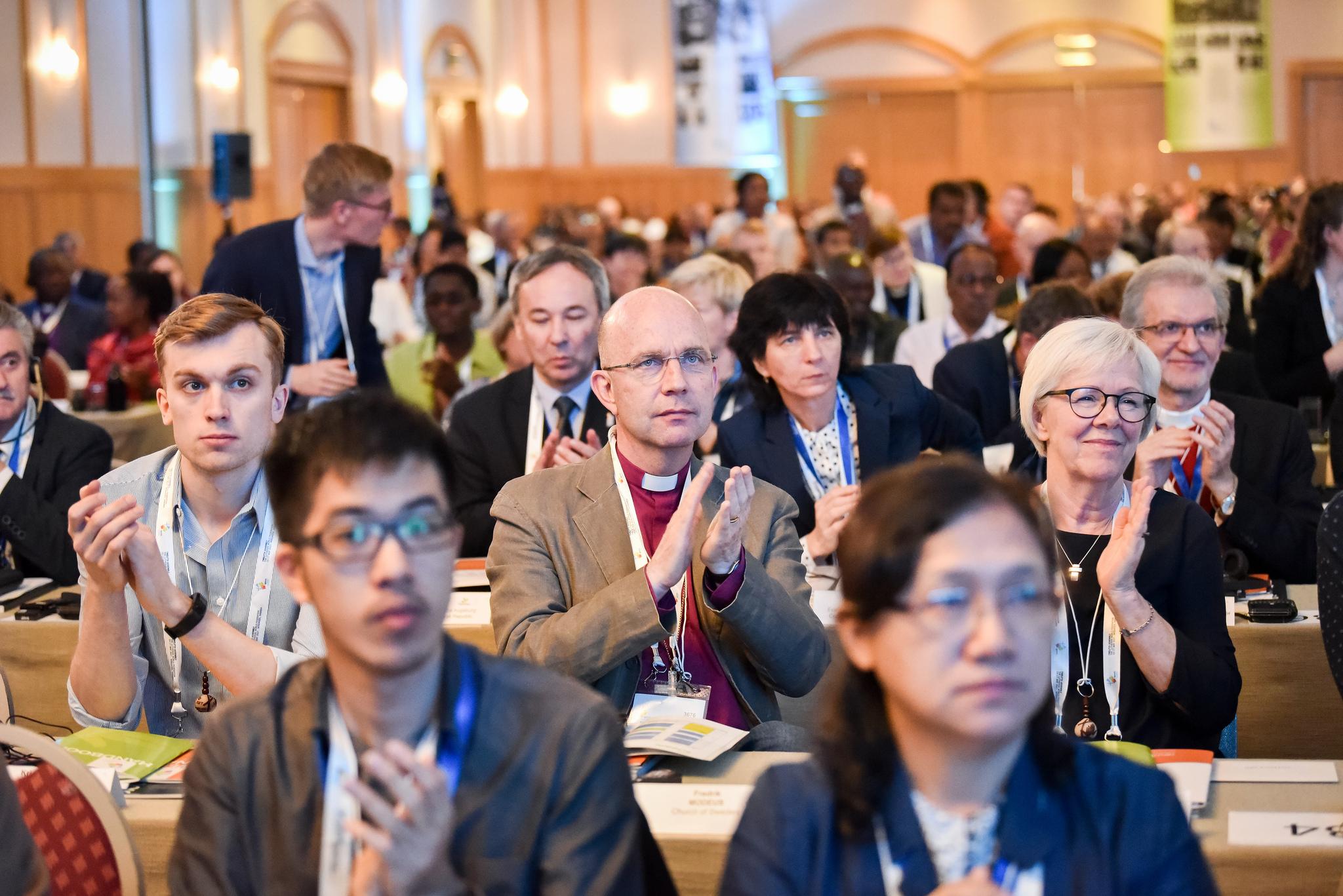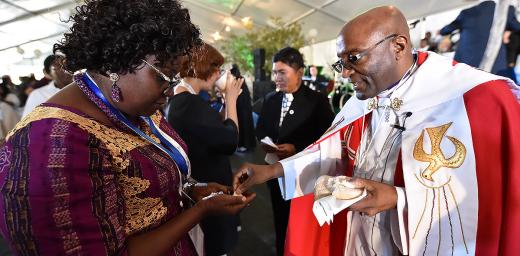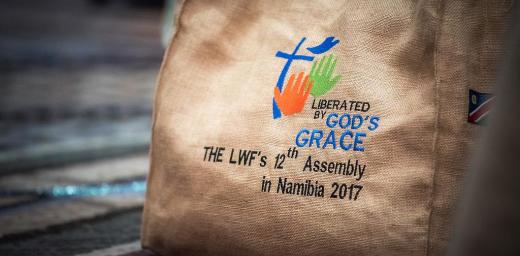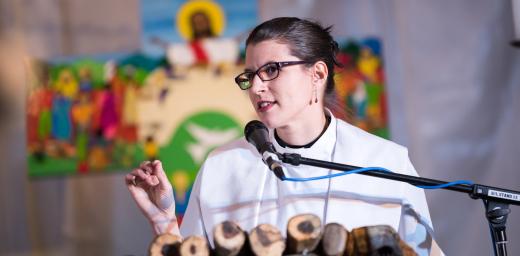Called to turn outward with gratitude for service

Delegates of the Twelfth Assembly of the Lutheran World Federation in Windhoek, Namibia. Photo: LWF/Albin Hillert
The Twelfth Assembly of The Lutheran World Federation (LWF) was a milestone opportunity to affirm the Lutheran communion as a shared gift and affirm its task to witness in the world with gratitude and joy.
In the Assembly Message from the 10-16 May gathering of LWF’s highest decision-making body, the member church delegates said, “Liberated by God’s grace, we are freed from sin to turn outward to thankfully and joyfully love and serve our neighbor.”
Liberated by God’s grace
The delegates said discussions on the theme and sub-themes had reaffirmed that God’s unconditional love is a free gift and that salvation, human beings and creation are “not for sale.”
Meeting during the 500th anniversary of the Reformation, they stated in the Assembly message that the LWF is a communion liberated by God’s grace in all aspects of its life and self-understanding. The delegates recognized the gift and task of communion in LWF’s commitment to reconciliation, communion building and prophetic diakonia, amid many social and economic factors that put “freedom” to the test.
The delegates noted that while the pain of division is still experienced today, they rejoiced that LWF’s engagement in ecumenical dialogue has borne fruit. They thanked God for the October 2016 Joint Catholic-Lutheran Commemoration of the Reformation, the Mennonite action of reconciliation in July 2010, and the 1999 foundational Lutheran-Catholic Joint Declaration on the Doctrine of Justification as experiences that “enliven us for the ministry of reconciliation entrusted to us.”
They commended ongoing interreligious dialogue and collaboration “for the common good,” but noted need for competencies on issues such as pastoral care for interreligious families.
Affirming the longing for reconciliation in all places “ where God’s liberation is still needed,” the Assembly named Namibia’s search for reconciliation with Germany, its former colonial power; and the long-standing conflict in the Holy Land.
The Assembly gave thanks for the continuing work and diaconal ministry of the LWF Department for World Service, ACT Alliance and that of ecumenical partners. It also expressed its thanks for recently established partnerships with Islamic Relief Worldwide and Caritas Internationalis.
The Assembly affirmed the UN 2030 agenda of Sustainable Development Goals, and called on churches in all countries to “commit or re-commit to doing their part to care for those often forgotten and excluded.”
Salvation - not for sale
The delegates noted “salvation cannot be sold, because it cannot be owned” as God in Christ has given it freely. Just like during Martin Luther’s time, they said, “salvation is commodified today in ways that manipulate, extort, build false hope and even kill. False interpretations of salvation, including the prevalence of the Prosperity Gospel, are again being sold in the marketplace.”
Human beings - not for sale
Proclaiming that human beings are not for sale, the delegates noted that baptism, empowers Christians to participate in God’s mission (missio Dei) “as followers of Jesus, co workers in promoting justice, peace and reconciliation.” The church was asked to resist economic and political ideologies that seek to commodify the gift of human life and instead strive to embody reconciling mechanisms of inclusion through fellowship, worship and diaconal service.
Pointing to the high number of displaced people in the world today—65 million—the delegates requested the LWF Communion Office “to continue advocating on behalf of refugees and migrants, and support member churches in developing their capacity to receive refugees and provide long-term development services to enhance their self-reliance.”
Full participation of all
They commended the Twelfth Assembly for meeting the LWF quota of 40 percent men, 40 percent women and 20 percent youth representation but acknowledged that full representation particularly of women and youth had not been achieved in local church settings. Youth were praised for their leadership in climate advocacy and intergenerational conversation.
Appreciation was expressed for the Gender Justice Policy, and LWF’s continuing journey of seeking to have women included as ordained pastors. The assembly applauded the 119 member churches currently ordaining both men and women for the ministry and urged “the member church that has ceased ordaining women to develop a process and timeline to reconsider this decision.”
Gender-based violence
In a world where at least one out of every three women experience some form of gender-based violence, the assembly stated “violence based on gender is unacceptable.” The delegates reminded churches of their “responsibility to address power imbalances present in patriarchal societies and to address stigma and taboos through appropriate and comprehensive sexual education.”
They recommended the LWF Church in the Public Space resource for use and study in the member churches to support advocacy for reconciling mechanisms of inclusion through fellowship, worship and diaconal service.
Rising inequality
The Assembly noted that while significant effort had been made to alleviate extreme poverty in the world, “the top 8 richest people control as much wealth as the bottom third of the global population.” Delegates said resource distribution and policies that allow extreme wealth accumulation and inequality must be addressed, as well as factors such as racism, caste and tribalism which often aggravate the situation.
Creation - not for sale
The Assembly professed God as a relational God who creates and enlivens creation as the source of all being. The delegates decried the increasing consumption habits of human beings--at 1.6 planets annually, and increasing--saying all of creation “groans under the weight of imbalance, overuse and misuse.”
They called on members of the communion to resist “the temptation and misinterpretation to act as masters with dominion over creation, but rather as stewards with responsibility” to care for creation.
Liberated by God’s Grace: the call we share
The Assembly message identifies communion as both a gift and a task. “Freed by grace through faith, we are liberated to be a church in service with the neighbor. Let us share fully in each other’s joys and sorrows; let us pray for one another and share our resources, spiritual and material, wherever possible.”
“We are liberated by God’s grace and go out joyfully to accept this call,” the Assembly message concludes.





